Dr. Keith Boenning and Dr. Nathan Dancykier help repair and replace patients’ teeth in our Towson, Maryland, dental office. Our dentists are experienced prosthodontists and use advanced techniques and digital technology for predictable and lasting results. By working with patients, we can evaluate their specific needs and provide quality restorative dental care.
Contact our dental office to protect damaged teeth, restore missing teeth, treat gum disease, or to stop TMJ problems. We even conduct dental surgery for extensive dental work. We will be happy to answer any of your questions and review your treatment options with you.

Restorative Dental Care
Our dentists use restorative dental treatments to treat a variety of dental problems. For example, we can remove infections, replace missing teeth, and help you address gum disease. Our comprehensive restorative dentistry has your best interests in mind and offer only the most relevant treatment plans.
Our dentists will ensure that the final results are healthy and secure for the long-term success of your oral health. Dental restorations that we provide include the following treatments and procedures.
Dental Bridge
A dental bridge is a series of artificial teeth that your dentist can use to replace a single tooth or multiple missing teeth. It consists of dental crowns, which will secure the bridge to the abutment teeth, and the replacement teeth or pontics. A dental bridge can also replace several missing in a row using at least two dental implants.
A traditional fixed bridge requires the dentist to permanently reduce the abutment teeth in size. An implant-secured bridge does not require damaging healthy remaining teeth. Dental implants placed in the jaw bone secure the bridge. To learn more about the kinds of dental bridges we offer, see Dental Bridge.
Dental Crown
A tooth crown may cover and protect deep tooth stains and tooth damage. This sturdy restoration also helps stabilize a bite. A dental crown is one of the most widely-used restorations in dentistry. The dentist will use a tooth cap or tooth crown to restore cracked teeth and teeth that have severe cavities.
The dental crown covers the entire tooth and sits permanently in place. It protects and strengthens tooth structure that dental fillings or other types of restorations cannot restore. To learn more about the dental crown process, see Dental Crown.
Dental Implants
A versatile restorative treatment, dental implants replace teeth at the root. An implant secured dental restoration will look and function just like natural teeth. A dental implant is a titanium screw-like post that your dentist will surgically place in the jaw bone. Here, it will fuse to the surrounding bone to create a durable base to hold a dental restoration.
A single dental implant can secure a dental crown to replace one missing tooth. Multiple dental implants can secure a denture or dental bridge in place to replace several missing teeth or a whole row of missing teeth. To learn more about the dental implant process, see Dental Implants.
Dentures and Partials
Dentures are removable dental restorations that replace missing teeth and some of the surrounding gum tissue. Patients with full arches of lost teeth can restore their smiles with full dentures. Dentures restore function and aesthetics to the mouth. Our dentists can also secure full dentures to your mouth using dental implants for a more durable fit.
We can also restore arches that have several missing teeth using partial dentures. Partial dentures are a framework of false teeth that will rest on the gums or clasp in between remaining teeth. To learn more about the benefits of receiving dentures, see Dentures and Partials.
Oral Surgical Procedures
Our dentists offer bone grafting, sinus lifts, and other surgical procedures. A sinus lift is a necessary oral surgery that will strengthen the bone tissue in the upper jaw. This procedure will allow patients to receive dental implants in the upper row to replace missing teeth.
Bone grafting is a similar procedure that will help build up the bone tissue after tooth loss. A bone grafting procedure is sometimes necessary after a tooth extraction or tooth loss. The surgery will also prepare your mouth for a dental implant procedure.
We offer anesthesia or dental sedation to provide the most comfortable care during these oral surgical procedures. To learn more about sinus lifts and bone grafting, see Oral Surgical Procedures.
Gum Disease Treatment
We can help restore the health of both your teeth and gums with periodontal disease treatments. Our doctors help patients that have mild periodontal symptoms or more serious gum disease issues.
A build up of unaddressed plaque in your mouth causes gum disease. Plaque is a sticky substance that coats the teeth and lets bacteria eat away at your gums and enamel. You must remove it regularly with diligent brushing, or it will begin to irritate your gums. Chronic plaque buildup will lead to gum disease.
To learn more about the symptoms of gum disease, see Periodontal Disease Treatment.
Prosthodontics
Dr. Keith Boenning and Dr. Nathan Dancykier are experienced local prosthodontists who restore and reinforce damaged teeth. They have years of experience in helping patients get the smile of their dreams. Patients who suffer from missing or damaged teeth will need teeth replacement services. As expert prosthodontists, our dentists can restore teeth that suffer from even the most complex issues.
To learn more about the prosthodontic treatments we offer, see Prosthodontics.
Treatments for TMJ Disorders
TMJ disorders can lead to severe tooth damage. Our first goal is to stop the damage. In our Towson office, we offer night guards for patients with jaw pain and tooth damage from TMJ disorders. Night guards will create a barrier between the top and bottom rows of teeth to stop them from making contact.
Next, we will fix the damage from your TMJ disorder issues. We will use restorative dentistry treatments such as dental crowns or tooth bonding to fix the damage. To learn more about the TMJ treatments we offer, see TMJ Treatment.
Restorative Dentistry FAQs
To learn more about restorative dentistry, read through our frequently asked questions. If you have additional questions, please contact our dental office.
What is the difference between orthodontics and prosthodontics?
Orthodontics is the branch of dentistry specializing in treating malocclusions, or problems with teeth alignment and jaw contact. Prosthodontics is a specialty field within dentistry that focuses on restoring and replacing missing teeth and other oral structures.
Orthodontic treatment usually involves braces or retainers to correct misalignment, while prosthodontic treatment includes dental implants and crowns. Both orthodontists and prosthodontists require additional education beyond regular dental training to specialize in their respective fields.
How painful is oral surgery?
The pain level patients will experience during oral surgery will vary. The pain will depend on the procedure and the patient’s pain threshold. However, dentists and oral surgeons take several measures to minimize your discomfort. Oral surgeons and dentists will use local anesthesia, sedation, or general anesthesia to ensure patients are comfortable during surgery.
After the procedure, some discomfort, swelling, or soreness might occur. You can manage discomfort with pain medications and by following your dental professional’s post-operative care instructions.
What are the stages of gum disease?
The initial stage is gingivitis, where gums become red and swollen and may bleed during brushing. The next stage is early periodontitis, where gums recede and pockets form between the teeth and gums. The third stage is moderate periodontitis, which involves deeper pockets. At this stage, there is an increase in bone loss and loose teeth.
Advanced periodontitis is the final stage. The patient will experience severe tooth and bone loss, gum recession, and tooth loss. Early detection and intervention are critical to preventing gum disease progression.
How many teeth can a dental bridge replace?
Generally, a dental bridge can replace anywhere from one to four teeth in a row. However, the exact number depends on many factors. Factors such as the location of the missing teeth, the strength of the abutment teeth, and the oral health status of the patient. Consult a dentist to determine the most suitable type and size of the dental bridge for your case.
Is restorative dentistry painful?
Restorative dentistry procedures, such as fillings, crowns, and dental implants, can involve some level of discomfort. However, dentists take measures to minimize pain and ensure comfort. Your dentist will use local anesthesia or sedation to help alleviate pain or anxiety during the procedure.
After a restorative treatment, patients may experience some soreness, swelling, or sensitivity. However, you manage these symptoms with pain medications and by following your aftercare instructions. Discuss any concerns about pain with your dentist.
Will my face look different with dentures?
Yes, dentures may change the appearance of your face. Dentures can positively impact your facial appearance by providing support for your facial muscles. Your facial muscles may sag or appear to sink in because of missing teeth, but dentures fix that. Dentists will design and fit dentures to help restore the natural contours of your face.
However, there might be a slight adjustment period as you get comfortable with the feel of the new dentures. Work closely with your dentist to ensure a comfortable fit and natural appearance.
Implant Dentistry in Towson, MD
Dr. Nathan Dancykier places all types of dental implants to restore missing teeth. This is the most naturally functioning treatment option. During your dental consultation, we will evaluate all aspects of your dental health. Then we will discuss your aesthetic goals before making a treatment plan to meet all your needs.
Using state-of-the-art technology, we can securely place implants to restore the form and function of the bite. Implants can become permanent anchors for a dental crown, bridge, or denture. Once in place, they offer natural biting, chewing, and speaking ability, restoring your confidence in your smile.
Schedule a consultation for restorative dentistry in Towson, MD, today. Call our restorative dentists for comprehensive dental solutions at 410-324-2294. You may also request an appointment with Dr. Boenning or Dr. Dancykier on our website.
Our Towson, MD, dental team can help you find the best solutions for your dental problems. All our dental restorations will match your natural tooth color and blend in with your best smile.
